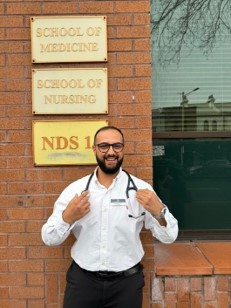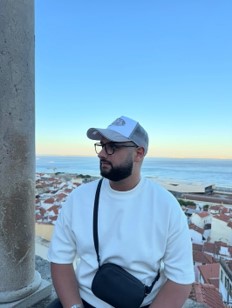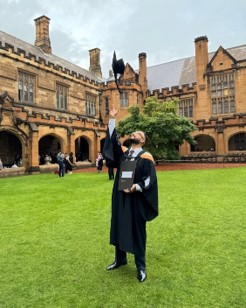“I’m reminded that my life isn’t completely ‘normal’ – but that’s okay – it’s my normal.” – Christian’s story

Christian. 23 years old. Crohn’s disease. Ankylosing spondylitis. Chronic spontaneous urticaria.
Wait… let’s give that another go.
Christian. 23 years old. Pharmacist. Medical student. Travel enthusiast. Thrill seeker. Foodie. F1 fanatic.
That’s a little bit better.
Let’s take it back to when I was growing up. I had a great childhood. I was raised in a loving family, enjoyed my time at school, was surrounded by friends who cared for me and tried my hand at quite a few sports. From rugby, to football to tennis, I never seemed to have enough skill to make any of them stick – but I had fun doing it all! My childhood was nothing out of the ordinary, I was healthy, happy and having a great time.
Then I completed my schooling and had the looming choice to make of what to do with my life. I had my heart set on a goal, and the first step was to complete a Bachelor of Pharmacy. That was at the start of 2020. By week four, we were in a national lockdown.
It wasn’t until second year that classes were back to normal, pub crawls were full of new friends, and travel was allowed again. But for some reason I wasn’t feeling the best.
I had previously been training at the gym five days a week, but now I couldn’t. Each day I would wake with multiple joints swollen, and this excruciating pain that would shoot from my lower back all the way down my leg. It would sometimes take me more than an hour just to muster up the courage lift myself out of bed.

A few GP visits, many, many physiotherapist appointments and a referral to a rheumatologist, I then had my diagnosis. Ankylosing spondylitis – I couldn’t even spell the words then, let alone understand the trajectory that would follow.
It took some time to find the medicines that worked for me, and many hours in the gym strengthening my body, but eventually I was feeling well again. I had my energy back and returned to doing the things I loved most.
With that, and as any 20-something year old university student does, I booked a 5-week European summer trip with my friends. I was living the dream. A new country every few days, checking off items from my bucket list and visiting the homeland with my grandparents.
As the trip came to an end, my joints were fine, but I wasn’t. I could’ve slept for the entire last week of the trip, and I couldn’t seem to get off the toilet seat. But that’s just because I was tired, and travellers’ diarrhoea right? I returned home from the trip and that’s when I knew something wasn’t right.
I would have the smallest bite to eat, or even drink water, and find myself running to the bathroom. In between toilet visits I had no energy. I slept for a majority of the day and all through the night, and I was still tired. To the GP, my rheumatologist, and finally a referral to a gastroenterologist, I again found out what was wrong. Crohn’s disease.
Funnily enough, I had just spent the previous semester learning of this disease. I was aware of its incurability and the various treatments that had to be tried before finding the one that worked for you. I knew things weren’t great when the night of my first colonoscopy I received a phone call from my doctor. He had already spoken to me before I left the hospital that afternoon.
It was 10pm. I had been back home for a few hours, replenished myself with mum’s dinner after a weekend of no eating and unnaturally flavoured lemon drinks, and was getting ready for bed. ‘Hi Christian,” the doctor said. “I just wanted to make sure you understood what I said to you after your procedure? I know the anaesthesia was still wearing off…”
He was checking that I was aware of what condition I had, that I received all the patient information sheets from the nursing staff, and had been to the pharmacy to collect the myriads of medications prescribed to me.
I had gone from being a 20-year-old with some type of arthritis, living a relatively normal life, to now a 20-year-old, with Crohn’s disease and arthritis, injecting a medication every two weeks and taking six tablets every morning. Every morning.
Spending the better part of three months on oral steroids, I was left feeling and looking different. My clothes didn’t fit properly anymore, and I had gone from losing ten or so kilograms before the diagnosis to putting on almost double whilst on the medication. I could eat three full meals a day, and yet still have the appetite as though I had eaten none. My skin changed as well; I now had to tackle acne with pimples covering my entire forehead.
Luckily for me, I was approved to use infliximab within three months of diagnosis and began infusions right away. That was in December of 2022.
At first, it was a bit of an odd feeling. I had gone from having this condition that I could treat at home, to now having to receive my medication at the hospital. There was a nurse there to check in on me, and a doctor on call in case something went wrong. Normally these situations were reserved for people who were really sick, or at least looked that way, but I was okay… why was I sitting next to all of these people who weren’t?
Every two months my infusion appointment rolls around, I have the cannula inserted and the infliximab administered, and I can’t help but be overcome with gratitude. Gratitude for my gastroenterologist and clinical team for their tireless work in making sure I am feeling well, for my family who have never stopped looking out for me even when I can’t look out for myself, and to myself for always showing up, day in and day out.
Since starting infliximab, I’ve had countless appointments with my doctor and IBD nurse, a few too many lemon flavoured bowel preparations, numerous colonoscopies and sometimes excessive bathroom visits.
I’ve also packed up my life and moved to London for six months. I’ve taken part in a placement program in rural India. I’ve travelled to Bali, Singapore, the UK, Hungary, Greece, Belgium, Netherlands, Spain… I’ve attended the AusGP. I’ve graduated from a Bachelor of Pharmacy. I’ve worked full-time. I’ve studied for and sat multiple exams. I’ve learnt how to cook (or at least am trying to). I’ve made new friends and reconnected with old. I’ve been to concerts and festivals and beaches and parties galore.
And this year, I’ve started studying my post graduate Doctor of Medicine in Sydney. I hope to one day use my experience of health, along with the way my doctor and his team continuously support and empower me, to help my patients captain their health journeys in this same way.



All of my achievements have been made possible by the cumulative efforts of everyone around me.
From my treating team to my family and friends, I’ve built a support system that helps me continue kicking my goals and achieving my dreams.
I am in remission at the moment, but I know that this may not be forever. I know that whilst I am in remission I may be fine endoscopically, but living with a chronic disease extends beyond this. It’s a daily, weekly, monthly struggle that calls you to make the most of every moment.
From constant fatigue to always making sure I know where the closest bathroom is, it can sometimes feel a little bit overwhelming. But in saying that, navigating life with a chronic illness has also taught me to make the most of every second and to work that little bit harder to achieve everything I’ve ever dreamed of.
Every two months, sitting in a hospital or at home, receiving my life-giving infusion, I’m reminded that my life isn’t completely ‘normal’ – but that’s okay – it’s my normal.

Support Christian as he takes on the Live Fearless Challenge!